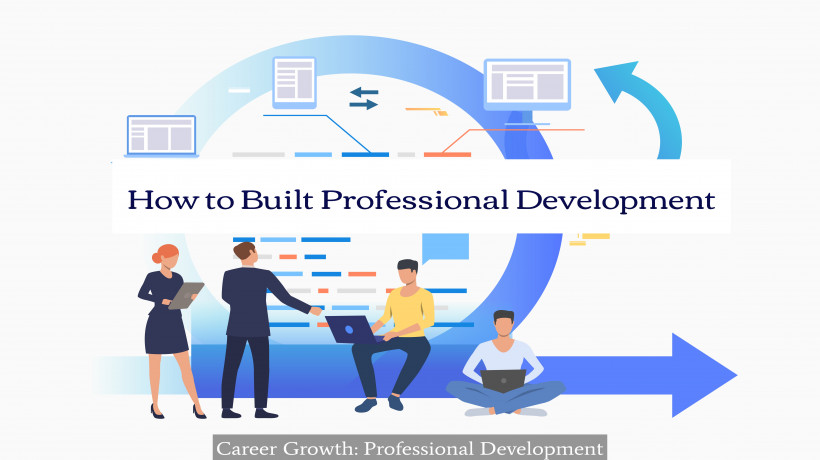How to Built Professional Development
To progress in your desired field it is essential to have potential skills & experience; Professional development is one such aspect which on needs to focus on for balanced development of career growth, check out the blog for insight on same!
December 10, 2021

Career Expert & Blogger

The foundation of personal and professional development is gaining new skills and experiences that can help you to make progress in your life and work. The two are heavily intertwined - if you’re keen to develop professionally then you might have to start with a time investment in personal growth first. This is about the self-awareness to understand what you want from life, and from your career, and tackling the things that might be holding you back, such as anxiety and fear.
Tips for managing personal and professional development
-
Set goals. That could be to be able to manage more people, bigger budgets or to achieve a higher profile within your organisation. If you’re clear on your objectives then you’ll be able to find the training, courses or experiences that are going to help you to achieve them.
-
Make sure you have a plan. Ongoing learning has a huge range of benefits for anyone, from boosting confidence to opening up new career paths. It is well worth creating an annual plan that integrates your goals and focuses on the development that you’re looking to achieve within the next 12 months. When you’re structuring your plan try to focus on completing one significant piece of training and development at least every three months.
-
Be selective about the opportunities that you come across. Are they aligned with the goals that you’ve set and are they going to be a good use of your time? Not every opportunity for learning and development is going to be a good fit with where you’re trying to go. That’s why it’s so important to be selective about how you dedicate the time (and resources) that you have available. Don’t be afraid to say no if you have a sense that the training or course just isn’t going to be a constructive use of your time.
-
Give yourself time to review your progress. If you’re setting goals then make sure you’re also tracking your progress and that you’ve set aside time to review how you’re doing on a regular basis. Reflecting on learning and development is an important part of ensuring that you get something from it - and also that you’re still heading in the right direction in terms of overall goals, objectives and planning.
Here are other major benefits of professional development:
-
It provides you with the needed skills to better perform your job and succeed in your line of work
-
It will provide you with the necessary certification(s) to prove skills and expertise in your field
-
It keeps professionals current on industry trends
-
It will boost your confidence and credibility
-
It will help boost your productivity and efficiency
-
It will open doors to new opportunities
-
It increases earning potentials and the likelihood of being hired
-
It provides networking opportunities
-
It can help accelerate your career
-
It opens the door to a future career change.
-
Determine Your Professional Goal and Make a Good Plan
Major Skills on How Built Professional Development:
-
Communicate Clearly
-
It will be challenging to achieve your career goals if you suck at communication. At certain levels of management in corporate bodies, clear communication is as essential as decisive actions.
-
Precise and efficient communication can help you in many ways.
-
The very first benefits include improved relationships with your bosses and subordinates.
-
You will find it easier to work with teams and your direct and broader management team.
-
Improve Your Leadership Skills
-
Some ambitious individuals stutter professionally because they fail to perform when presented with the opportunity they have longed for. With time and effort, you can attain leadership positions. In most instances, how you handle the position will determine whether you can climb higher or be limited in your career progression.
-
Instead of focusing on attaining a leadership position, work on your leadership skills as a part of your professional development endeavors.
-
Become Aware Of Your Strengths
-
Sometimes all it takes to achieve personal growth is self-awareness. Do you know your current strength? Are you aware that some of your strengths that you are not taking seriously can help you climb the career ladder?
-
Leverage your strengths to create a better future in the workplace and your industry. If there are weaknesses that are not compatible with the future you want, address them as much as possible. Knowing your strength can also help you set the right goals and career path.
-
Be Visible
-
No matter how hard you work or how skillful or knowledgeable you are, being invisible in your workplace will always work against you and your aspirations.
-
Increasing Your Visibility – Raising Your Profile at Work.
-
Make Connections and Learn How to Use Them
-
When it comes to career advancement, the need to make connections can never be overemphasized. In many instances, it is all about who you know and how you relate with them.
-
The best way to make the best of your connections is to take personal advancement seriously while establishing these connections. Learn new things from the people you meet, and don’t be afraid to exchange meaningful ideas.
-
Reflecting on Your Learning and applying your learning: Reflecting on what you have learned is a vital part of continuing professional development. Learning does not emerge only from activities that you designated as ‘development’, and you may find that you are learning at least as much from your day-to-day activities.
-
Sharing Your Learning with Others: It is certainly true that being able to articulate and share your learning is an important part of making sure that you have fully internalised it.

